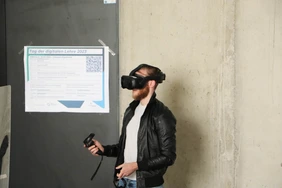These topics were the focus of the Digital Teaching Day at THI on 10 May. In his welcome address, THI President Prof. Dr. Walter Schober introduced the more than 50 guests to the core topics of the event. "AI and programmes like ChatGPT will change teaching a lot in the next few years; and the future skills that are in demand on the job market are also changing. The aim of our teaching is to provide students with these future skills in the best possible way in order to shape the future," said Schober.
What exactly this means was then demonstrated by Prof. Dr. Hans-Joachim Hof, THI Vice President for Digitalisation, and Prof. Dr. Munir Georges, Research Professor for Speech and Text Comprehension at THI, with a keynote on the use of the AI chatbot ChatGPT in the university environment. Hof explained how ChatGPT could change studying and working at the university. In doing so, he put forward a number of theses, such as that voice and text assistants like ChatGPT will be as much a matter of course in five years as calculators, a navigation device or a spell checker are today. "There are certain techniques without which one could not imagine working in the past. But these have become obsolete nowadays due to certain new techniques," Hof said. As an example, he mentioned the slide rule or even the Duden.
A positive attitude towards technology and the use of AI is important in his view, as interaction with it is inevitable. Hof recommended: "We should train students to use language assistants competently and responsibly and also hold them accountable for their work results."
So what do students need to learn at all for the job market of the future and what will be done by AI in the future? Hof sees it as the task of universities to teach curricularly anchored skills that will be important in the future, such as creativity and critical thinking. These skills cannot easily be taught by AI, so human intelligence is increasingly needed here. Munir Georges showed the guests at the event what AI-supported language and text models are already capable of and where the limits lie, using a programme developed at the THI.
In addition to teaching students how to use AI, THI employees are also involved in various projects on the use of digitisation and AI in teaching. They presented their work after the lectures. With "THI-SuccessAI", a project was presented that could revolutionise university teaching: The project team is working on the realisation of individualised learning paths to offer students AI-based assistance tailored to their learning needs. To this end, an AI-supported learning platform is being created, which - in addition to face-to-face courses - is intended to increase students' individual success in their studies and reduce dropout rates. The tool is currently only being used in selected pilot modules. In the long term, however, this individualised learning is intended to increase student success in all subject areas at the university.
The "THI-Learning LabVR" project also provided insights into the work done so far. Here, an innovative testing and experience space for learning and collaboration with virtual reality (VR) support is being created at the THI. The project team is evaluating learning and working in VR in comparison to real learning environments, especially with regard to aspects such as learning anxiety, stress or fun in learning.
The afternoon offered students and lecturers the opportunity to contribute and discuss their own ideas and wishes for the university of the future.
The Digital Teaching Day took place for the seventh time at the university and provides an overview of the teaching and learning of the future. In addition, the students awarded professors for their outstanding teaching during the event.



![[Translate to English:] Logo Akkreditierungsrat: Systemakkreditiert](/fileadmin/_processed_/2/8/csm_AR-Siegel_Systemakkreditierung_bc4ea3377d.webp)








![[Translate to English:] Logo IHK Ausbildungsbetrieb 2023](/fileadmin/_processed_/6/0/csm_IHK_Ausbildungsbetrieb_digital_2023_6850f47537.webp)


